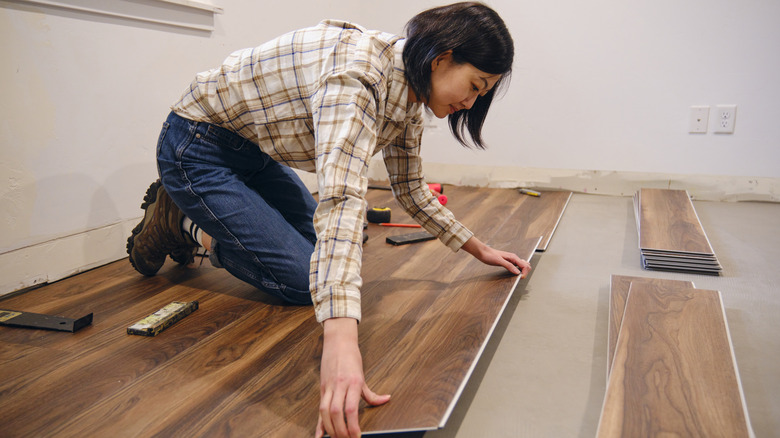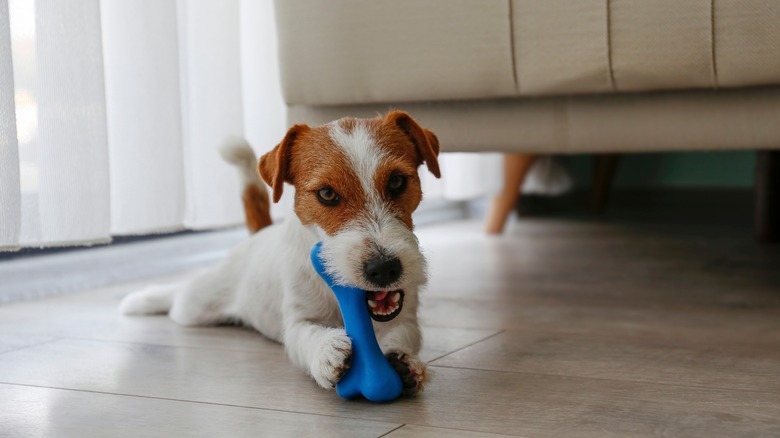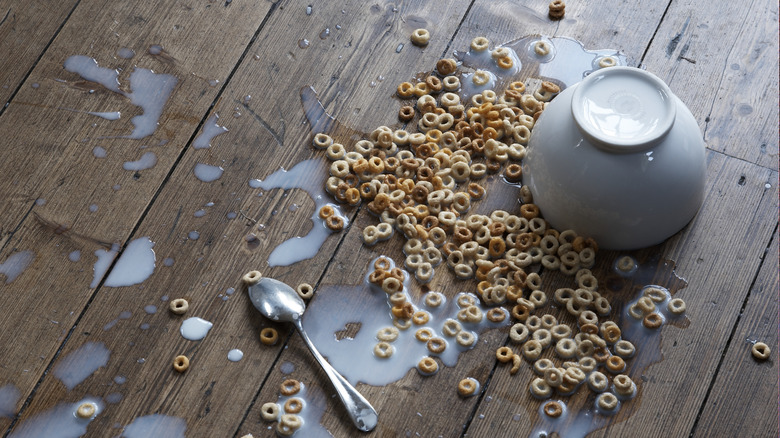The Biggest Mistake Christina Hall Sees Homeowners Make When Updating Flooring
The floor is one of the most important features of a room. It contributes to the overall look of the design, yet many people don't give it the consideration it needs. Notably, HGTV's Christina Hall has noticed that some people don't consider their lifestyle and the home's residents when picking out flooring material options.
In an interview with Parade, Hall was asked about the biggest mistake homeowners make when updating their flooring. "[Not] taking into consideration pets and kids," she said. "Pets have little nails and children, obviously, spills and everything." While kids and pets can bring plenty of fun to our lives, they're not the most careful beings. And that can wreak havoc on the floors of your home.
Understanding the way you use your home — which rooms you use the most and what for — should inform the materials you choose for your floors. However, Hall noticed homeowners don't always think this through. "So I just say really knowing what your heavy traffic zones are like, and understanding that certain materials can be more porous than you may expect," she said. You may fall in love with a flooring material because of how well it fits into your space aesthetically, but it might be a mismatch functionally. Knowing the qualities of the material can help ensure you're putting in flooring that will work well in a certain space.
Durability should be top of mind
Even if you don't have pets or kids that could damage the floors, durability should still be one of the most important features for the material you choose. When it comes to flooring durability, look for products that are scratch- and water-resistant. Scratch resistance will protect against damage from shoes or toys and nails moving across the surface. And water-resistant materials won't be affected by spilled drinks or puppy potty accidents.
Luxury vinyl plank (LPV) flooring is one of the current go-to options for busy households, and one that Christina Hall has used in her designs before. She even has her own line of LVP flooring. On top of being both water-resistant and scratch-resistant, luxury vinyl is also easy to clean and highly resistant to staining. LVP flooring is a good option for pretty much any room in the house, but especially high-traffic spaces like living rooms, playrooms, kitchens, and bathrooms, where kids, pets, and the rest of the family are most likely to spend a lot of their time.
Natural stone and ceramic tiles are also durable flooring options. These materials are naturally hard, which allows them to stand up to the activity of busy households. They also tend to be manufactured to be water-resistant, so they're great for bathrooms and kitchens that may experience splashes and spills. Though wood is a popular option for most homes and a naturally hard material, it isn't scratch-resistant. Choosing harder wood species can help prevent scratches.
Material porosity is also important
Many homeowners may not realize how porous their flooring materials really are, and porosity is something Christina Hall believes people should take note of. Porous materials have tiny little holes that can let liquid into the material. These holes are rarely visible to the naked eye, so they might not be at the top of your mind when choosing flooring materials. When liquid comes into contact with a porous material, it can cause damage, such as discoloration, splitting, or cracking.
Various types of natural stone, natural wood, and concrete are all examples of porous materials that many people consider using for flooring. While natural stones like granite, limestone, and marble are porous, you can use sealers to create a protective barrier that helps keep liquid from discoloring or cracking the tile. There are also sealants for concrete floors to add an extra layer of protection. Regardless, you should still consider the location of porous flooring materials. For example, hardwood floors may be alright in living rooms where spills are cleaned up quickly. But this material may not fare as well in bathrooms where it's repeatedly exposed to water through kids splashing or the humidity from a shower. Excess water can seep into the floor boards, causing them to warp and buckle. Hall mentions that homeowners may not realize how porous common flooring materials are, and keeping this in mind can save you from future headaches.


